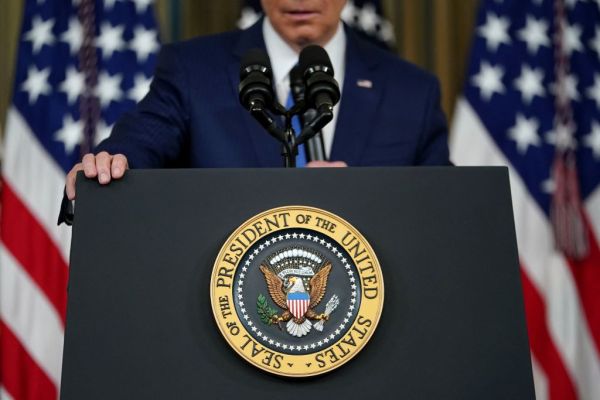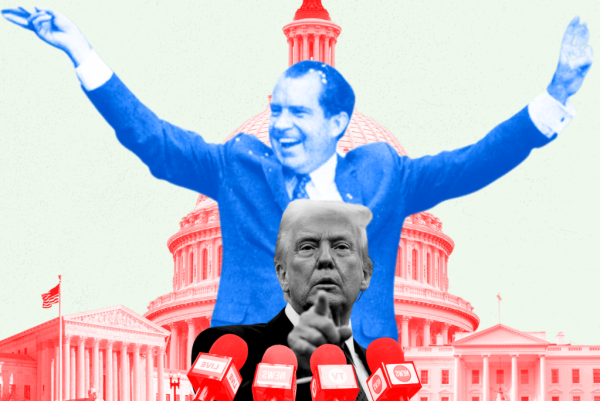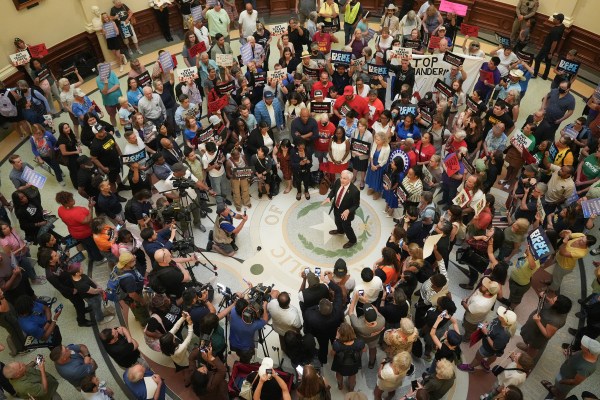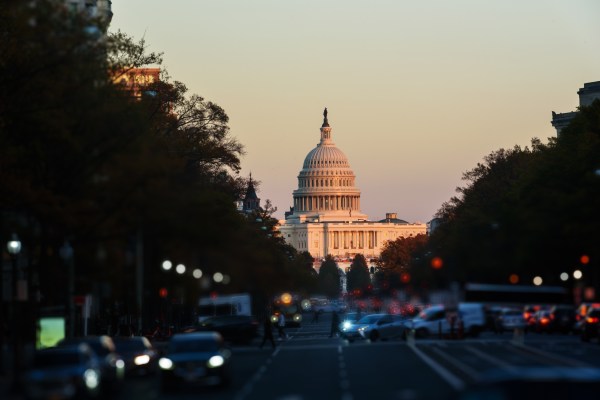February is rather peculiar. Not only is it the shortest month of the year, it also contains one of the strangest holidays on the American calendar. No, not Groundhog Day—Presidents’ Day. At first glance, the holiday doesn’t seem especially out of the ordinary. Societies across time have honored their leaders, often in elaborate ceremonies of deference and submission, even to the point of deification, whether in the form of towering statues, grand processions, or national holidays. But in a constitutional republic like ours, where the head of state is not a king but a citizen-executive, reveling so much in the individual men who have held the office seems out of place, to say the least.
We’ve resolved this paradox by grounding our celebration in the man for whom the presidency was fashioned: George Washington. Washington was the archetype of civic virtue—a leader who knew when to lay down his sword or scepter and return to private life. Like Cincinnatus of the early Roman Republic, he relinquished power, not once but twice, first as a victorious general, then as a president who could have ruled indefinitely. He also established precedents that defined the office: republican restraint, peaceful transitions of power, and a two-term tradition that remained unbroken until the hubristic ambitions of Franklin Roosevelt. Washington understood that the most dangerous threat to a republic was not an external enemy but the natural impulse of power to expand itself and transform a limited executive role into something more permanent and imperial.
Today, however, a different vision of presidential leadership is taking shape, one that’s more Jacksonian than Washingtonian. For decades, executive power has increasingly concentrated in the occupant of the Oval Office, but this seems to have come to a head as of late. Barack Obama’s executive order on Deferred Action for Childhood Arrivals (DACA), Joe Biden’s student-debt forgiveness plan, and Donald Trump’s use of emergency power to impose tariffs on China, Canada, and Mexico, are just the latest examples of how modern presidents have increasingly bypassed Congress to enact significant policy changes on their own.
Buttressing this trend is the unitary executive theory (UET), a constitutional interpretation that asserts the president alone wields executive power. This theory is rooted primarily in the Constitution’s Vesting Clause, which states that “the executive Power shall be vested in a President of the United States of America.” Proponents argue that this language, found in Article II, renders the president the sole proprietor of the executive branch, meaning that any congressional attempts to limit or divide executive functions, such as restricting the president’s removal power over officials, are unconstitutional.
To be fair, UET is not without merit. The president is, after all, the only person elected by the entire nation. Article II of the Constitution empowers him, and him alone. The administrative state—the vast network of regulatory agencies, rulemaking bodies, and career bureaucrats—is often seen as obstructing the will of the people. If the president is the singular expression of the general will, shouldn’t he be the one empowered to rule unilaterally?
Well, if conservatism means anything, the answer should be no. American conservatism, rightly understood, is the advocacy for the preservation of the liberal Enlightenment principles that form the foundation of our republic: separation of powers, rule of law, and a healthy skepticism of concentrated authority. The Framers of the Constitution did not vest absolute power in one man. They did the opposite. Congress, not the president, is the first branch of government: While each branch is equally essential, the legislative branch was designed to be the most powerful. Article I vests legislative power in Congress. The Appointments Clause ensures that the Senate, not the president alone, confirms high-ranking officials rather than allowing them to be installed at a president’s whim. The power of the purse is the exclusive province of the legislature. Yet, in the last few decades, conservatives, who purport to be the defenders of the values of the American founding, have drifted toward UET.
This fetishization of executive power isn’t merely a remnant of Nixonian subterfuge. Rightfully dismayed by the size and scope of the federal government, some conservatives view the unitary executive, particularly when in Republican hands, as a panacea—a force capable of taking a sledgehammer to the ‘fourth branch of government’ and taming the leviathan.
We saw a similar dynamic play out in conservatives’ approach to Chevron deference, established by Chevron U.S.A., Inc. v. Natural Resources Defense Council, Inc., which required courts to defer to an agency’s reasonable interpretation of an ambiguous statute. During the Reagan years, many on the right supported the doctrine, as the Reagan Environmental Protection Agency (EPA) used its discretion to cut red tape and roll back regulations. But once they saw how it could be wielded by subsequent Democratic administrations, their enthusiasm faded. Indeed, most conservatives cheered the Supreme Court’s Loper Bright Enterprises v. Raimondo decision, which overturned Chevron last year, yet many of these same people seem to have forgotten to apply Chevron’s lessons on the dangers of using state power for one’s own ends in the context of presidential authority.
Take Elon Musk’s efforts via the Department of Government Efficiency (DOGE), for instance. Amid the torrent of actions the second Trump administration has taken in its first month in office, perhaps none has been as shocking as DOGE’s effective shuttering of the United States Agency for International Development (USAID) and the Consumer Financial Protection Bureau (CFPB). Beyond the obvious ramifications for American soft power and financial regulation, one of the less-discussed aspects of this move is its constitutional implications. Congress alone has the power to create or abolish federal agencies, meaning the president and his minions lack the unilateral authority to shut down USAID and the CFPB or withhold their funds in a way that would cripple them. Such actions amount to a blatant usurpation of Congress’s power of the purse and likely run afoul of the Impoundment Control Act and Administrative Procedures Act.
And this approach isn’t even the most effective. If Trump and Musk really wanted to make lasting change, they could have gone through Congress to permanently dismantle these organizations. Instead, by circumventing the legislative process, they’ve ensured that the next Democratic administration can easily reconstitute them as they wish. Ironically, DOGE is engaging in extraconstitutional action to strengthen the executive branch—yet had they followed the normal channels, they’d likely have achieved greater success.
Civil service protections for career federal employees are another example of the Trump Administration eroding checks on presidential power. Some conservatives who decry an all-powerful administrative state now, in the same breath, argue that all civil servants should be directly subordinate to the president. But if we are skeptical of unchecked concentrations of power, why place even more of that regulatory authority in the hands of a single elected official? The modern civil service was established by the Pendleton Act of 1883, which mandated merit-based hiring and barred politically motivated firings to prevent presidents from using federal employment as a patronage system. Later laws, such as the Hatch Act of 1939, the Civil Service Reform Act of 1978, and the Whistleblower Protection Act of 1989, further reinforced these protections. Do we really want to return to what preceded this—the spoils system, where party loyalty dictates government hiring? A nonpartisan bureaucracy is an essential component of any liberal democracy. There is nothing inherently “conservative” about turning civil servants into political cronies. Indeed, traditional conservative values include continuity and suspicion of majoritarian governance.
But the radicalism doesn’t end there. The Trump administration’s sweeping new executive order extends presidential authority over independent agencies—entities like the Federal Trade Commission (FTC) that are technically part of the executive branch but, at least in theory, are insulated from political interference. The order requires them to submit regulations for White House review, adhere to the Trump administration’s legal interpretations, and accept constraints on their funding and decision-making. This move effectively eliminates any semblance of agency independence in legal decision-making, further consolidating power in the executive branch. While conservatives may welcome this as a means of dismantling the bureaucratic machinery of government, they should also recognize the potential for self-sabotage.
Indeed, bringing independent agencies more closely under presidential control may ultimately lead to more left-wing policy outcomes. This is not to say that constitutional questions should be decided based on ideological considerations, but it is a reality worth acknowledging. If conservatives cheer the dismantling of agencies under a strong Republican executive, they may be in for a rude awakening when a future progressive administration leverages the very same powers to centralize control over the administrative state. A Democratic president could, for example, push aggressive regulatory expansions or use consolidated executive authority to implement a more interventionist economic agenda.
But if that’s what the Constitution demands, so be it. The problem is that this is far from certain. The Necessary and Proper Clause gives Congress the authority to structure the government in ways that best serve its enumerated powers, including establishing entities that execute laws with insulation from political interference. Early congressional practice supports this: the First Congress created the Sinking Fund Commission, a financial body charged with managing the national debt by purchasing government securities using surplus revenue, which functioned independently of the president. (It was also structured to include key officials who could not be removed by the President at will.) Moreover, the Founders’ emphasis on checks and balances suggests they did not envision a unitary executive with absolute control over all federal officers. Rather, they understood that Congress could place conditions on the execution of its laws—ensuring that regulatory bodies essential to the general welfare could operate without undue political influence.
That’s not to say that independent agencies are perfect. This Progressive Era innovation in governance undoubtedly has constitutional defects; independent agencies often simultaneously exercise legislative, executive, and judicial functions, raising serious separation-of-powers concerns. And the for-cause removal protections for some independent agency commissioners and administrators upheld in Humphrey’s Executor v. United States are arguably unconstitutional constraints on the president’s Article II powers.
Given the significant ambiguity in this area of the law, if conservatives really want to see reform, they should instead consider pursuing a constitutional amendment to legitimize independent agencies while recognizing only a limited category where stability and insulation from politics are essential. Institutions that necessitate independence, like the Federal Reserve, should be structured this way to prevent abrupt policy shifts and political interference.
Perhaps even certain prosecutorial functions should be shielded from executive influence. Former acting U.S. Attorney Danielle Sassoon reminded us of the importance of prosecutorial independence last week when she resigned from her post rather than drop the federal corruption charges against New York City Mayor Eric Adams—a dismissal based not on the merits of the case but on the political machinations of the Trump team. Justice Antonin Scalia may have been correct as a matter of law in his famed Morrison v. Olson dissent when he argued that the provision in the Ethics in Government Act of 1978 allowing a judicial panel, at the Attorney General’s request, to appoint an independent counsel to investigate and prosecute high-ranking officials, ensuring the prosecution’s independence, was unconstitutional because it restricted presidential control over executive officers. Yet, as a policy matter, prosecutorial independence remains crucial for upholding the rule of law and checking executive abuse.
There was a time when conservatives understood all this. Roger Scruton famously quipped that “good things are easily destroyed, but not easily created.” Conservatives distrusted rank majoritarianism and Rousseauian notions like the “general will,” and were the first to warn against the dangers of autocracy. But today, in their rush to dismantle the administrative state, too many on the right are laying the groundwork for something equally, if not more dangerous: a personalist presidency where the occupant of the White House, Republican or future Democrat, rules wholly unrestrained. The Resolute Desk is not a throne. And those who wish to refashion it into one are not the inheritors of the Founders’ vision. They are its betrayers.








Please note that we at The Dispatch hold ourselves, our work, and our commenters to a higher standard than other places on the internet. We welcome comments that foster genuine debate or discussion—including comments critical of us or our work—but responses that include ad hominem attacks on fellow Dispatch members or are intended to stoke fear and anger may be moderated.
With your membership, you only have the ability to comment on The Morning Dispatch articles. Consider upgrading to join the conversation everywhere.